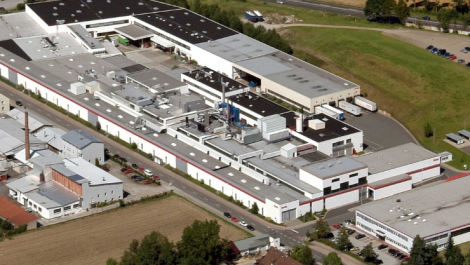Digital Printer has spoken to some of the leading people in print to find out what they think of the economic support offered by the Government during this crisis and what they believe the financial health of the industry will look like when the pandemic is over. In this, the first of two articles, we bring you their thoughts.
Since the Coronavirus outbreak struck the Government has gone to unprecedented lengths to try and protect the British economy as well as the people and companies that make it up. The Chancellor has introduced CBILS, the Furlough Scheme, changed bankruptcy laws and more.
Furthermore, lobbied by various industry bodies, Westminster has taken various steps to protect print specifically, including allowing print to remain open for business throughout.

Route 1 – Mark Young
‘I know this is pretty polarising as these policies haven’t worked for everyone but I’ve been really impressed with the government’s response. This has been completely unprecedented and it’s not a job I would have liked. The business loan scheme is going to save a lot of businesses and the job retention scheme is going to save a lot of jobs, that’s a good thing.
‘Some companies are going to really struggle to get through this, whilst this can be a really hard time for the industry there will also be a lot of opportunity out there. We’ll definitely see some people disappearing.’
The need to protect print seems obvious given that the UK’s print industry is the fifth largest in the world, with a turnover in the ballpark of £14 billion. Its approximately 112,000 employees are spread across 8000 different companies, meaning that each employs an average of 14 people. The Government knows this, but have its schemes gone far enough and is the industry satisfied with how they have been implemented?
Brendan Perring, general manager of the IPIA, has been at the forefront of the fight to make sure print is protected during this crisis. His organisation, along with BAPC, called on members of the industry to contact the Government as part of an effort to influence its policy and secure special financial assistance for the print sector. They then met with the Department for Business, Energy, and Industrial Strategy (BEIS) back at the end of March and were instrumental in ensuring that print could remain open for business. Most recently they announced that a subsequent meeting with BEIS had given them ’cause to be confident’ about the support the print sector will receive from Westminster.
Mr Perring sat down with Digital Printer (not in the flesh of course) to give his thoughts on how the Government has reacted to the situation. ‘The Government has listened to us,’ Mr Perring said. ‘They have been supportive and showed they understand the intricacies of the situation. They know that the money needs to come from somewhere, that it’s impossible to tailor solutions to every industry and certainly they’ve done their best.
![]()
Flexpress – Steve Wenlock
‘When it comes to the Government’s response, given how quickly this hit us I think there were some knee jerk reactions, statements and policies which hadn’t been thought about enough. It’s still a very fluid situation with variations and initiatives being announced all the time. I think it’s less about what’s already happened and more about what’s going to happen and it seems there’s still plenty of time to think about that.
‘When it comes to things like mergers and acquisitions those with money tend to make more money in a crisis. There will be a lot of companies forced to quit and others unwilling to carry on. Those looking to grow will be like kiddies in a sweet shop and be able to bag some real bargains that wouldn’t have been possible prior to the pandemic.’
‘I have heard some people criticising the Government because certain banks have been hesitant to loan money, or not provided favourable terms. Having dealt directly with BEIS I want to stress that this is a free country, the Government can suggest and ask, even threaten, but they cannot compel the banks to do anything.’
Leaving Westminster aside for the moment, Mr Perring has seen as much information as anyone when it comes to how the crisis is affecting companies in the print space. We asked him how he thought the industry might look when the pandemic is over.
‘There are going to be considerable changes to our industry,’ Mr Perring said. ‘Despite the Government’s support, and that support will allow thousands of companies to keep persevering, our information suggests that we will lose 1000 of the 8000 companies in print by the end of 2020.
‘SMEs are obviously the most exposed, but there will also be a huge impact on B2 printers who have already struggled to adapt to changes to the sector and the impact of things like Brexit. In short we are going to be left with a far more consolidated industry.’

8 Days a Week – Lance Hill
‘We will potentially see this crisis (sadly) finish off a few businesses. The more financially secure and well-funded companies may see opportunities out there to enlarge themselves. Everything will depend how strong companies are when the dust settles. How quickly will orders come back? Being strong before the crisis isn’t a guarantee that you are going to be strong after it.
‘As for the Government’s support I give them credit for the ideas they’ve put forward. In terms of implementation, the proof will be in the pudding. Furloughing has been well received and is fantastic in principle. We’ve furloughed four people though we haven’t made a claim yet as we’re not desperate for the cash. My wife works for one of the bigger banks so let’s just say that CBILS has led to some interesting dinner table debates.’
This obviously makes harrowing reading for all of us, though Mr Perring does manage to find some silver linings on the storm clouds. ‘For a long time too many companies have been engaged in a race to the bottom when it comes to cost,’ he continues. ‘The ones doing this have made life very difficult for the others. I predict that the companies that survive this crisis best will be those who don’t focus on cost, but value, with print merely being the vehicle by which that value is delivered.
‘When all of this is over successful companies will be those that understand their client’s end goal and use the technology at our disposal to provide that, not just the ones who offer to do it for the least amount of money. In short, at least for the foreseeable future, we will be an industry of less volume, less price focused and far more consultative.’
At the end of our conversation, when asked if there was anything else he wanted to raise, Mr Perring did have one final piece of advice for people working in print. ‘I want to stress that a lot of owners and directors are relying solely on accountants and HR professionals when it comes to understanding the schemes and options available to them,’ he concluded.
‘These people always err on the side of caution, and I understand why, but they don’t have any more information than the rest of us. Do your own due diligence, IPIA has set up tools for this very purpose, the information is all out there for you to judge for yourselves.’

Bakergoodchild – Paul Brough
‘There will be an increase in mergers and acquisitions and some companies are going to go by the wayside. There will definitely be challenges for those of us left, but we shouldn’t forget that this was happening anyway, this crisis will simply accelerate the process.
‘I have been pleasantly surprised, and impressed, by the Furlough Scheme. Without it a lot of companies would have been forced to make people redundant, and of course there are costs associated with that as well. The scheme has given companies a fighting chance and actually I think there should be more praise for it, having to set up the scheme, get the IT system in place, to get it off the ground, that is no mean achievement.’




